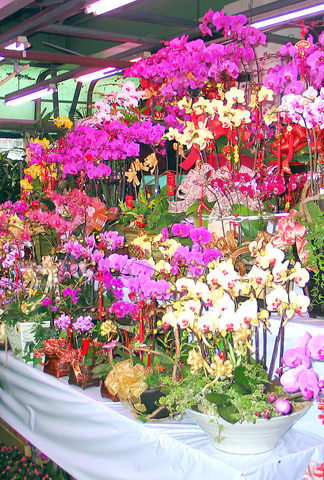Before sundown on Lunar New Year's Eve, you need to clean the house, settle outstanding debts, resolve any differences with family and friends and purchase the essential holiday flowers. The last project can be achieved at the flower markets under the Jianguo expressway, or in Neihu.
In preparation for the New Year celebrations, both markets flourish with an array of holiday plants, flowers and consumers.

PHOTO: DIANA FREUNDL, TAIPEI TIMES
On any regular weekend, Jianguo Flower Market (
While Jianguo is the more tourist-friendly market, Neihu boasts a larger size and se-
lection. Formerly part of the Bingjiang Street fruit and flower market, it relocated to the bigger venue in Neihu a few years ago. The market carries everything associated with plant life, from seedlings and gardening tools to gigantic potted plants. An early morning trip witnessed numerous florists stocking up on holiday flora to be sold at their own neighborhood vendors.
Most of the flowers sold at the market are grown in Taiwan, but there are a variety of imported plants and flowers. Orchids, kumquat trees, bamboo, water lilies and plum blossoms are the most in demand at this time of year, said Zhou Jing-ping (
"Any flowers or plants are suitable. People even buy daisies for their homes; but just don't give them [daisies] to someone, because they are associated with bereavement," he explained.
While each plant is associated with a particular meaning, fresh flowers and plants in general symbolize rebirth and growth, so they are an essential New Year's decoration.
Orchids or plum blossoms arranged with bamboo and pine stems are one of the most common combinations and symbolize perseverance, unity and longevity. Tangerines, oranges and kumquat trees are also popular for their representation of wealth and fortune.
In terms of pricing, the best deals are found in Neihu, where orchids sell for NT$200 per stem while more elaborate arrangements in decorative vases cost NT$2,500 on average . Kumquat trees range from NT$400 to NT$1,500 depending on size. Single flowers and bouquets sell for a fraction of what they cost at smaller markets. Twenty long-stemmed red roses, which cost NT$50 in the Neihu market, are sold for NT$200 or more by some flower vendors.
Filling a home with flowers may not bring wealth or career advancement, but without the roots there can be no fruit. And lucky is the home in which a plant blooms on New Year's Day: This foretells a year of prosperity.
To accommodate seasonal customers, the hours of operation at both markets have been extended until New Year's Eve. The Neihu Flower Market is located at 400, Rueiguang Rd, Neihu, (

A vaccine to fight dementia? It turns out there may already be one — shots that prevent painful shingles also appear to protect aging brains. A new study found shingles vaccination cut older adults’ risk of developing dementia over the next seven years by 20 percent. The research, published Wednesday in the journal Nature, is part of growing understanding about how many factors influence brain health as we age — and what we can do about it. “It’s a very robust finding,” said lead researcher Pascal Geldsetzer of Stanford University. And “women seem to benefit more,” important as they’re at higher risk of

March 31 to April 6 On May 13, 1950, National Taiwan University Hospital otolaryngologist Su You-peng (蘇友鵬) was summoned to the director’s office. He thought someone had complained about him practicing the violin at night, but when he entered the room, he knew something was terribly wrong. He saw several burly men who appeared to be government secret agents, and three other resident doctors: internist Hsu Chiang (許強), dermatologist Hu Pao-chen (胡寶珍) and ophthalmologist Hu Hsin-lin (胡鑫麟). They were handcuffed, herded onto two jeeps and taken to the Secrecy Bureau (保密局) for questioning. Su was still in his doctor’s robes at

Last week the Democratic Progressive Party (DPP) said that the budget cuts voted for by the China-aligned parties in the legislature, are intended to force the DPP to hike electricity rates. The public would then blame it for the rate hike. It’s fairly clear that the first part of that is correct. Slashing the budget of state-run Taiwan Power Co (Taipower, 台電) is a move intended to cause discontent with the DPP when electricity rates go up. Taipower’s debt, NT$422.9 billion (US$12.78 billion), is one of the numerous permanent crises created by the nation’s construction-industrial state and the developmentalist mentality it

Experts say that the devastating earthquake in Myanmar on Friday was likely the strongest to hit the country in decades, with disaster modeling suggesting thousands could be dead. Automatic assessments from the US Geological Survey (USGS) said the shallow 7.7-magnitude quake northwest of the central Myanmar city of Sagaing triggered a red alert for shaking-related fatalities and economic losses. “High casualties and extensive damage are probable and the disaster is likely widespread,” it said, locating the epicentre near the central Myanmar city of Mandalay, home to more than a million people. Myanmar’s ruling junta said on Saturday morning that the number killed had